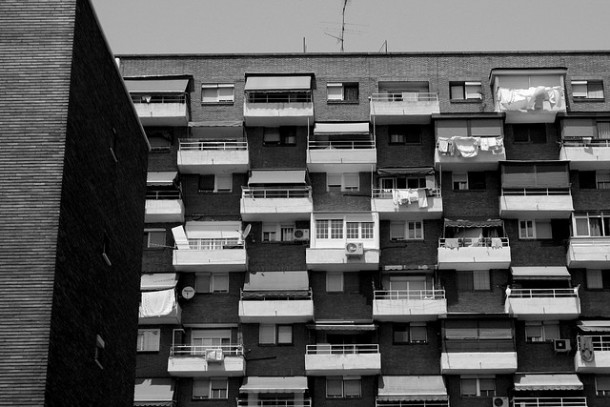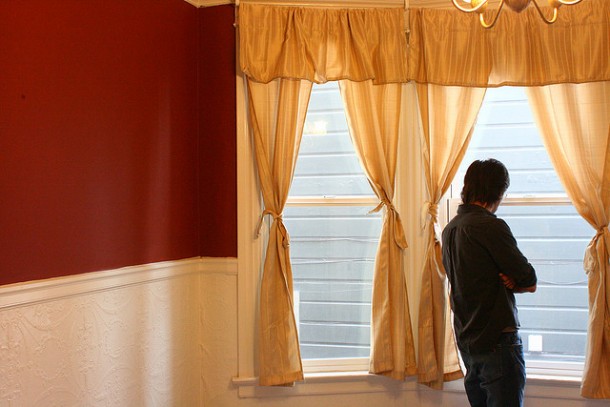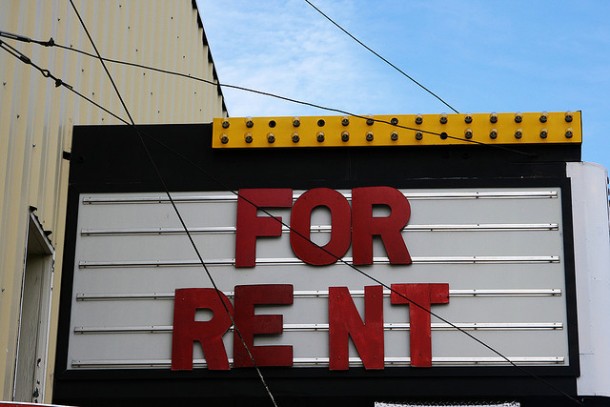MADRID, SPAIN. Apartment hunting is no easy feat, and even less so when you’re living in a foreign country. It can be headache-inducing and tedious, especially when there are a ton of other things to get accustomed to upon arrival. But with a bit of luck, organization, and know-how, you can snatch up an adequate abode in no time. Below are some tips on how to go about finding the place that’s perfect for you in Madrid.
#1. What type of living situation are you looking for?

Apartment building in Madrid | ohhector.
Depending on the purpose of your stay in Madrid, thinking over your options and choosing the correct one for you is essential for having a worthwhile experience. Your apartment can wind up being just the place where you sleep, or it can be a place where you make friends, practice Spanish, eat delicious meals prepared by your homestay mom, and relax with peers, or it can be the haven where you can be completely alone. Here are some questions to ask yourself:
- Do you prefer living alone in a studio?
- Or would you like to share an apartment? If so, with whom? Friends? Strangers?
- Would you perhaps like living in a student residence?
- Or is a homestay witha family or an older resident going to work better for you? Depending on the purpose of your stay in Madrid, thinking over your options and choosing the correct one for you is essential for having a worthwhile experience.
If one of your priorities is perfecting your Spanish, living with your friends or other English-speaking roommates is not recommended. Take the dive and look for Spanish roommates, or even live with a family or a señora, which will force you to practice your Spanish in everyday situations. If you’re looking to explore the nightlife in Madrid, and lead a more independent kind of lifestyle but like to socialize, find a place with people your age, either dorm-style in a student residence, or in a 2 or 3-bedroom apartment. Are you looking for a short-term stay or a year-long commitment? It’s recommendable to look for a place where you can sign a short-term contract, say for 3 months, rather than commit yourself to an apartment for a whole year, unless you’re 100% sure about the location and about your stay. Most people wind up leaving for the summer and desperately seeking a subletter for those months, which is highly difficult. It’s good to give yourself room to deal with unexpected situations, in case your roommate turns out to be crazy, or if you aren’t completely satisfied with your apartment.
#2. What kind of neighborhood do you want to live in?

Smooching reindeers, or graffiti in Chueca, Madrid’s gay neighborhood | uBookworm.
Location is important! Choose your neighborhood carefully depending on where you will work or study; you don’t want to have to transfer three times on the metro every day or spend a lot of time commuting. Check out the public transportation, both the metro and bus lines, to and from where you need to go before deciding on which neighborhood will be adequate for you. Like in all cities, the center of Madrid is the most expensive as well as the most sought-out place to live. If you prefer being in the middle of all the hubbub and being able to walk home after a night out, you may want to sacrifice apartment space for an ideal location in el centro, which includes neighborhoods such as Chueca, Malasaña, Sol, and Opera. The apartments in these areas are generally older, and some may not have elevators, air conditioning, or even proper heating. But these cases vary so you’ll have to check with your landlord. Choose your neighborhood carefully depending on where you will work or study; you don’t want to have to transfer three times on the metro every day or spend a lot of time commuting. The neighborhoods surrounding the center are more affordable and less hectic and noisy. Some are more familial areas with mom and pop shops and a small, old town feel, for example Iglesia, Bilbao, or La Latina, and some are neighborhoods with a high concentration of foreigners and immigrants, such as Lavapiés and Tetuán. The farther out you go from the center, the less expensive the apartments will be, the quieter the area, and the more space you’ll get for your money. As for safety, none of the neighborhoods are infamous for crime, as Madrid is a relatively safe city, but it’s recommendable to check out the area both during the day and at night to make sure you’re comfortable with it.
#3. How much are you willing to pay?

Apartments in Madrid can be expensive – two origami dollars won’t suffice… | Fun in NH.
Prepare a budget and work out how much you can afford to pay monthly for rent. Generally speaking, apartments can range from 250-300 Euros on the low end to 500-600 Euros on the higher end, unless you’re looking for a studio, which will cost you up to 700 – 800 Euros. In most cases you’ll pay a flat rate per month and gastos, or utility bills, on top of that, unless it’s a price with todo incluido, everything included.Generally speaking, apartments can range from 250-300 Euros on the low end to 500-600 Euros on the higher end, unless you’re looking for a studio, which will cost you up to 700 – 800 Euros. A normal-sized 2 or 3-bedroom apartment in a residential neighborhood outside of the center may cost you around 400-450 euros monthly per room. Apartments which are much farther away by public transport can cost as little as 250, whereas in the center, 500 euros can get you a hip location but little space, unless you share a large apartment with as much as 5 or 6 people. Of course, these prices depend on factors such as apartment condition and amenities, so it’s good to assess if those factors plus the location are worth the price. Living with a family can save you some money, as you can choose to include meals with the monthly rent, or also living in a student residence, whose dorm-style type of housing makes it more affordable for younger people. If you are interested in a homestay, your university program will help you arrange one. Once you’ve decided on the maximum amount you’re willing to pay, your hunt has just become much easier.
#4. Different places to look for ads, online and off
When you’ve got the type of apartment, your budget, and neighborhood preferences in mind, it’s time to start the hunt! Looking through online ads is also the easiest way to go for apartments. Here are some websites where you can search through apartment ads or even place your own:
If you’re struggling with Spanish, some websites in English include:
If you’re participating in a university program, you should also contact advisors or professors who can give you tips or connect you with people who are possibly renting out rooms. Facebook community groups can also be a big help for issues of apartment hunting and other needs. Like everywhere, be careful of false advertising and scams. Don’t trust anybody who asks you for credit card or Paypal information beforehand, unless it’s an official, protected agency website, or anybody who tells you any longwinded story to get you to wire them money. You should be very suspicious if an apartment sounds too good to be true, because there are many false adverts out there. Another option is looking through a housing agency such as innovate.es or aluni.net, which is a bit more expensive, but which can be more reliable in terms of getting help with the search process, drawing up legal contracts, making payments, and guaranteeing standard apartment conditions. Going through a middle man can sometimes be a pain but may make things less messy if something goes wrong. Also be on the look-out for “For Rent” signs (se alquila) while you’re passing by any neighborhoods. Check the local newspapers and magazines, and stop to look at the ads in shop windows and notice boards in cafés or other businesses.
#5. How to go about the hunt

Apartment hunting in Madrid | Andreas_MB
Even though it can make settling in kind of hectic, it’s most recommendable to wait until you arrive in Madrid to start hunting, so that you can speak to the landlord face to face and see the apartment for yourself. This will allow you to see who you’re dealing with, what kind of neighborhood it is, and if the apartment is really like what the ad describes. You can pay for a hostal or hotel for the first week or so or even couchsurf during the time that you’ll be hunting.Don’t bother e-mailing. Don’t bother e-mailing. In the week that it will take landlords to respond to or even to read your e-mail, the apartment will already be rented out. Rooms go fast in Madrid. Brush up on your Spanish housing terms before arriving, since most people don’t speak English. When you’ve found something that interests you, call directly to arrange a visit, and write down any questions you may have. If you need something in particular like WiFi or a TV, make sure it’s definitely available because if not, the process of installing anything, like all other processes in Spain, will most likely be a long and arduous one. And always call to follow up; it’s a matter of survival to be direct, insistent, and prompt in Spain. If you really want to have an apartment waiting for you before your arrival, make sure to use a trusted agency website which allows you to see pictures, room dimensions, and contract agreements. In this case you should choose a short-term stay, in case you end up not liking the apartment and wanting to move elsewhere. Before deciding on taking an apartment, make sure everything is clear and that your landlord draws up a contract for you to sign, not only agreeing on length of stay and payment terms, but also detailing the original condition of the apartment and its furniture so that you will not be held accountable for anything that was already in bad condition beforehand.
#6. Important things to know about finding an apartment in Madrid

Signing a contract or “contrato” for an apartment in Madrid | LOSINPUN.
Depending on the landlord or agency, you will usually need to make a one or two-month deposit upon signing a contract which is refundable at the end of the contract term, but which is forfeited if the terms are violated. Therefore, it’s very important to have those terms clearly stated. In some cases, people who are subletting will forego the deposit, which can make things financially easier for you.Above all, take the initiative and be smart; having to deal with things the Spanish way isn’t easy! Utilities include heat, electricity, gas, water and WiFi and will vary from month to month, unless they are included in your monthly rent. Make sure the apartment has everything you need in working condition, and if something needs repair, that your landlord is in charge of having it fixed. It pays to be firm and unabashed about apartment issues from the start, not only with your landlord but with roommates, so that problems won’t snowball and make your living experience miserable. Above all, take the initiative and be smart; having to deal with things the Spanish way isn’t easy! With some luck and persistence, you’ll soon find an apartment that will make your stay in Madrid an amazing one. Good luck and happy hunting!

